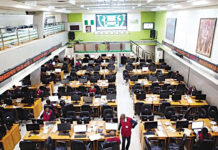The Nigerian currency, the naira, experienced a notable appreciation in both the parallel market and the Nigerian Autonomous Foreign Exchange Market (NAFEM) yesterday. This shift has caught the attention of financial analysts and the general public, signaling potential changes in Nigeria’s foreign exchange dynamics.

In the parallel market, also known as the black market, the naira appreciated to N1,590 per dollar, a slight improvement from N1,595 per dollar on Wednesday. The parallel market, which operates outside the official banking system, is influenced by supply and demand forces and often reflects the real exchange rate perceived by many businesses and individuals in Nigeria. The slight appreciation suggests an increased supply of dollars or a reduced demand for foreign currency.
In the official market, the Naira also showed signs of strength. The Nigerian Autonomous Foreign Exchange Market (NAFEM), which provides a more regulated environment for currency trading, saw the naira appreciate to N1,593.62 per dollar from N1,596.52 per dollar the previous day. This N2.9 appreciation is a positive indicator for the Nigerian economy, as a stronger naira can help curb inflation and improve purchasing power.
Data from FMDQ, a financial markets data provider, revealed that the volume of dollars traded in the official market surged by 51%, reaching $141.99 million compared to $93.92 million on Wednesday. This increase in trading volume indicates a higher level of participation and confidence in the market.
Several factors could be contributing to the naira’s recent appreciation. Firstly, increased foreign exchange inflows, possibly from rising oil prices or foreign investments, could be boosting the supply of dollars in the market. Nigeria, being an oil-dependent economy, often sees its currency value fluctuate in tandem with global oil prices.
Secondly, measures taken by the Central Bank of Nigeria (CBN) to stabilize the naira might be yielding results. The CBN has been implementing policies to reduce dollar demand and encourage local production, which may be gradually impacting the exchange rate.
Lastly, the appreciation could be attributed to speculative activities in the market. Traders anticipating future gains might be driving up the demand for naira, thereby affecting the exchange rate.
Despite the appreciation, the margin between the parallel market rate and the NAFEM rate widened to N3.52 per dollar from N1.52 per dollar on Wednesday. This growing gap highlights the persistent disparity between the two markets, which can pose challenges for businesses and individuals relying on foreign exchange.
The divergence between the parallel and official markets often results from limited access to foreign currency in the official market, leading some to turn to the parallel market for their needs. This disparity can create an uneven playing field, particularly for small and medium-sized enterprises (SMEs) that may struggle to compete with larger firms with better access to official market rates.
A stronger naira has several potential benefits for the Nigerian economy. It can help reduce inflationary pressures by lowering the cost of imported goods and services. Additionally, it can boost investor confidence, encouraging more foreign direct investment into the country.
However, the central bank must remain cautious. An overly rapid appreciation could harm exporters by making Nigerian goods less competitive abroad. Balancing the exchange rate to support both consumers and producers is crucial for sustainable economic growth.
The recent appreciation of the naira in both the parallel and official markets is a positive sign for Nigeria’s economy. While challenges remain, particularly the widening gap between market rates, the strengthening currency provides hope for improved economic stability. Continued efforts by the Central Bank of Nigeria and policymakers will be essential in maintaining this momentum and addressing the underlying issues in the foreign exchange market.




